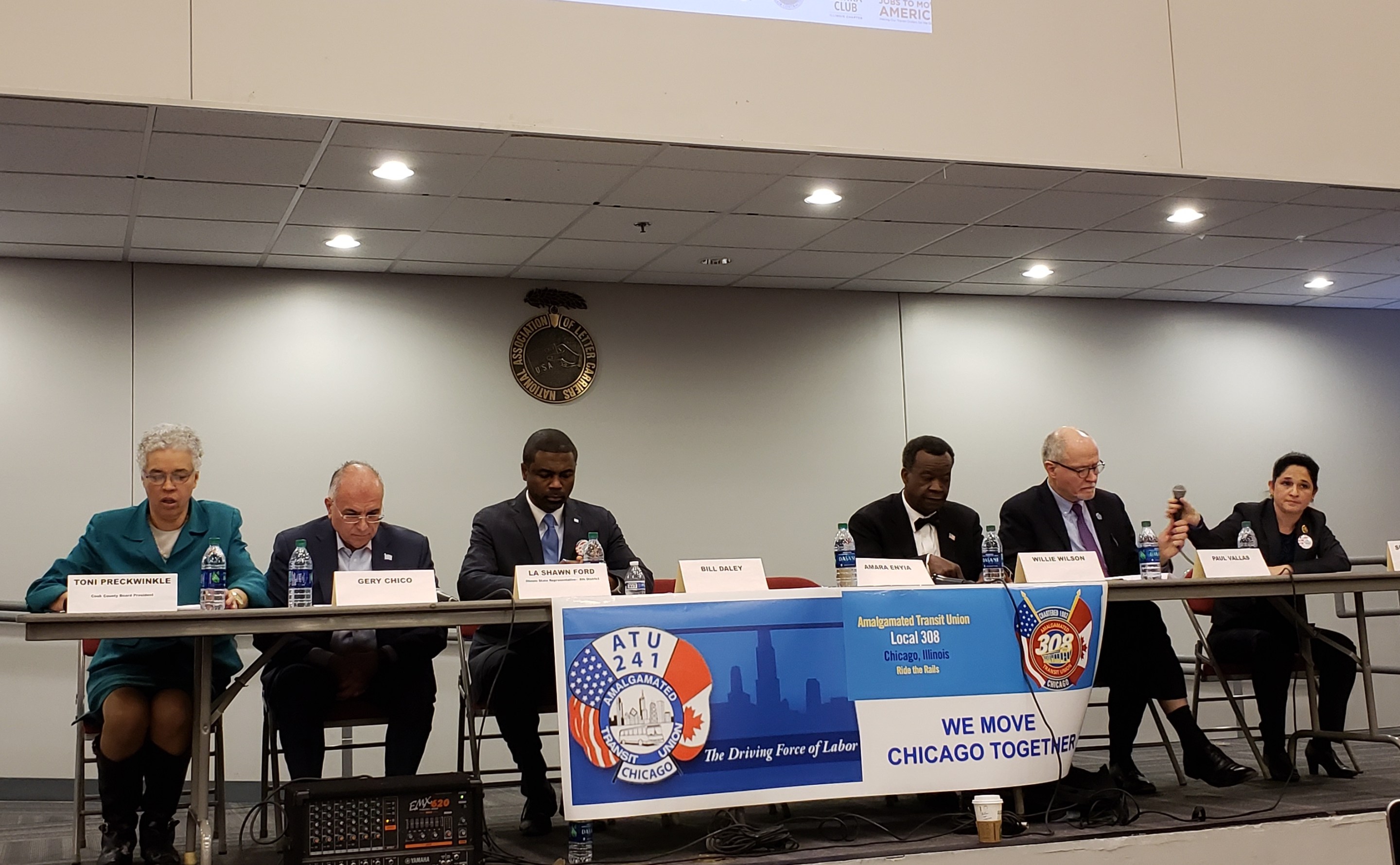Frigid temperatures hit Chicago this weekend, but that didn’t stop people from packing the National Association of Letter Carriers Union Hall for the Transit 4 All mayoral forum last Sunday. The Transit 4 All title refers to a campaign organized by the workers' rights coalition Chicago Jobs With Justice, meant to transform Chicago transportation. Moderating the forum was Phil Rogers, an NBC5 reporter.
Each candidate gave an opening statement regarding their campaign and their thoughts about transit. “A world class city needs a world class transportation system,” said candidate Gery Chico, former board president of the Chicago Public Schools.
The first question focused on the urgency of passing an Illinois capital bill, particularly because our state hasn't hasn’t had a major one since 2009. Candidates were asked how they would work with Springfield and Washington D.C. to get the legislation passed.
Illinois comptroller Susana Mendoza expressed confidence that the state will pass a capital bill under new governor J.B. Pritzker. Former CPS chief Paul Vallas emphasized the need to secure the legislation by being non-confrontational with leaders, particularly at the federal level.
State representative LaShawn Ford said Chicago needs to leverage the powerful Illinois lawmakers in Washington, such as Senator Dick Durbin and Congresswoman Jan Schakowsky, to get the transportation funding we need. In addition to funding, Ford said, we need to make sure the money goes to the parts of town that need it the most.
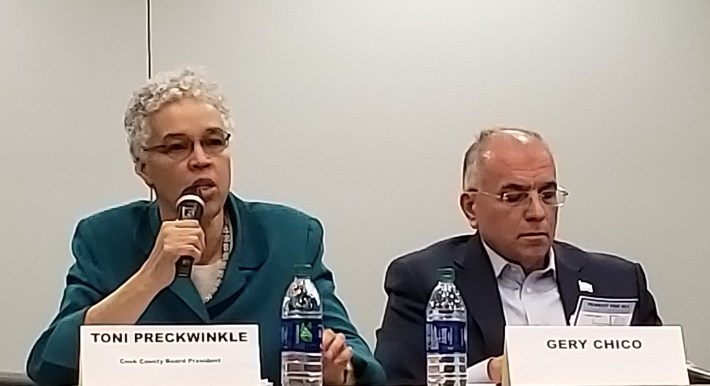
“We need to focus our transit dollars in the south and west sides,” echoed Cook County board president Toni Preckwinkle. “Transit investments are economic development investments.”
Chico brought up the need to find other ways to fund transit beyond the capital bill, such as through tax-increment financing and transit-oriented development projects.
Safety and crime is a major theme in conversations around Chicago transit, and candidates were asked about their positions on law enforcement and the CTA. “Having a presence of the police force on the CTA would serve as a deterrent for crime,” Mendoza said. “It is a good thing to have surveillance cameras.”
Vallas said the Chicago Police Department should be responsible for fighting crime on the CTA, and also brought up the idea of installing panic buttons within the system.
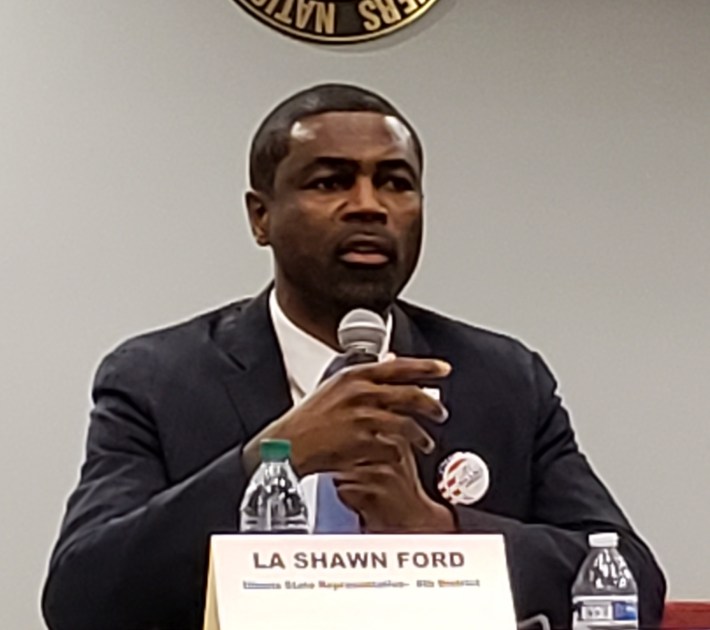
Ford had a slightly different take on the issue, and noted that crime is fueled by disinvestment in communities. “We need to make sure we give people jobs,” Ford said. “That will help restore dignity and reduce crime.” Ford did agree that having more of a police presence on the system would be helpful, but added that the officers on transit patrol should be trained to help connect people with the services they need when issues come up. For example, he said, officers should be available to take people to mental health facilities when the need arises.
Preckwinkle shared that sentiment. “We need CPD [officers] that are trained in de-escalation because mental health issues need to be addressed,” she said. “We can’t have an effective mass transit system unless people feel safe.” She added that, along with policing, increasing the frequency and ridership of CTA service would make the system safer.
Candidates were also asked about having transit unions represented on the CTA board, an idea they all seemed to support. “It would be a breathe of fresh air to have representation from transit unions,” Chico said.
Ford pointed out that the CTA board is a taxpayer funded board and said we need to consider how to make it more democratic.
“I think we need members that represent labor, regular riders, and the disability community to be on the CTA board,” Preckwinkle said.
It wouldn’t be a transit forum if the contentious issue of ride-share didn’t come up. Candidates were asked about how to regulate companies such as Uber and Lyft as public transit ridership declines. “We need to tax ride-share and car-sharing,” said Preckwinkle. “Ride-sharing and car-sharing have a place, but they’re not as well-regulated as the taxi industry.”
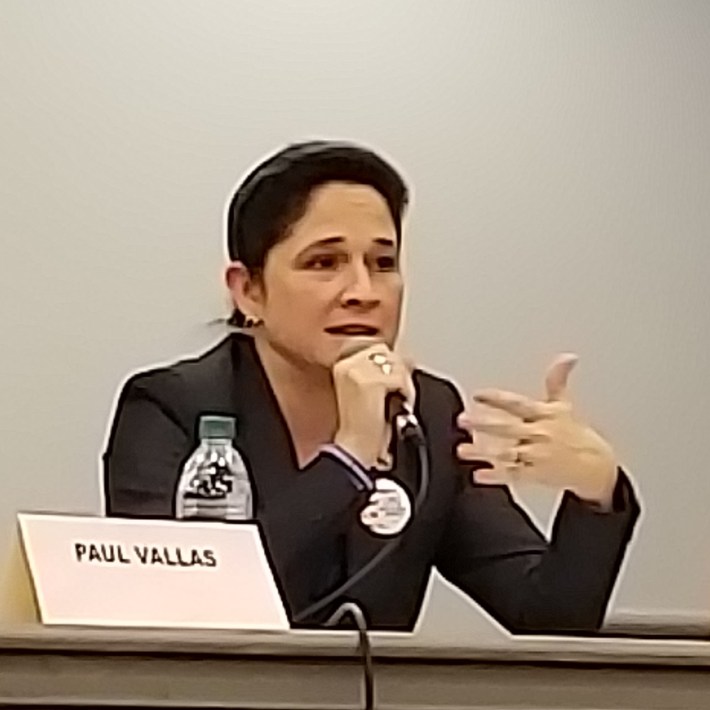
Chico agreed that more regulation is needed, adding that we need to ensure that ride-share drivers are paid a living wage. Mendoza echoed this sentiment, “We need to make sure we are not just creating more low wage [jobs].”
Ford pointed out ride-share has created employment opportunities for people who might otherwise have few options. He agreed that we need more regulation, but said we also need to acknowledge the potential benefits of the industry.
Millionaire businessman Willie Wilson noted that ride-share cars go to communities that have been historically underserved by taxis and transit. He added that ride-share's chilling effect on CTA ridership could be addressed by lowering transit fares.
Vallas said improving the quality of public transit would make it more competitive with Uber and Lyft.
Candidates were also asked about their positions on autonomous vehicles. Most candidates expressed concerns about the safety of the vehicles.“Machines fail,” Ford said. “It’s a little premature for autonomous vehicles.”
Candidates were also asked whether they support Elon Musk’s O’Hare Express proposal. Most, if not all, do not. “If we are going to make public transit investments, it should be to CTA and Metra,” Preckinkle said, noting the need to prioritize the Red Line extension to 130th Street and the creation of a universal fare card.
Chico didn’t hold back in his disdain for the O’hare project. “It’s going to die on its own. This thing is goofy,” he said.
Ford said that the project reflects the current mayor tendency to cater to the elite, and that we should instead be asking developers to invest in the local economy to help communities. Wilson echoed this sentiment.
“I’d kill it," said Vallas about the O'Hare project. “I can’t wait to kill it.”
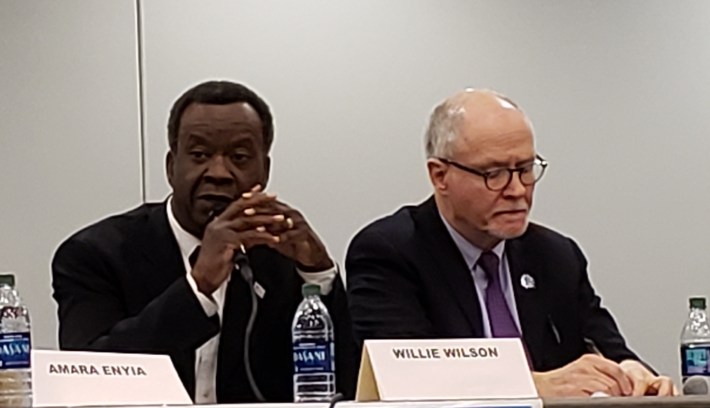
The last question of the night focused on the potential for reducing CTA fares fares. The answers were a mixture of responses supportive lowering fares to and skeptical about funding the price cuts. Chico argued that before we give any new segment of the population discounted fares, we need to find ways to pay for them. Vallas seconded this and said we would need to secure revenue from Springfield to make this happen.
“The population that needs reduced fares are students,” Preckwinkle said.
During closing statements, candidates reaffirmed their support for public transit. Mendoza also brought up an issue that wasn’t discussed at the forum. “We need to expand bus lanes,” she stressed. “I’m committed to bringing transit to transit deserts and boosting last-mile connections.”
The coalition partners and co-hosts of the mayoral forum were the Amalgamated Transit Union (ATU) Local 308, ATU Local 241, ATU International, Chicago Federation of Labor, International Brotherhood of Electrical Workers Local 134, Sierra Club Illinois Chapter, Sheet Metal Workers International Association, and International Union of Operating Engineers.
![]()
Did you appreciate this post? Consider making a donation through our PublicGood site.
